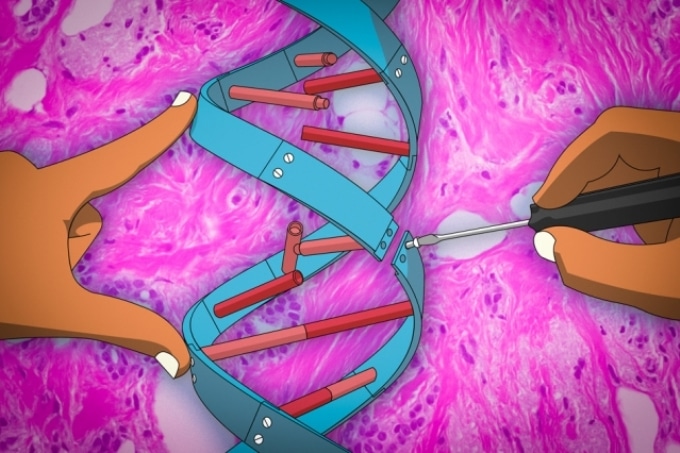Sep 22 2016
A major cause of mortality in women with breast cancer is the spread of malignant cells around the body called as metastasis. Recently, a team of MIT researchers are in the process of formulating a new gene therapy method, which shows potential as a novel approach to prevent breast cancer tumors from metastasizing.
 A new gene therapy technique being developed by researchers at MIT uses microRNAs — small noncoding RNA molecules that regulate gene expression — to control breast cancer metastasis. (Image: MIT News)
A new gene therapy technique being developed by researchers at MIT uses microRNAs — small noncoding RNA molecules that regulate gene expression — to control breast cancer metastasis. (Image: MIT News)
The treatment, illustrated in a paper published in the Nature Communications journal, makes use of microRNAs — small non-coding RNA molecules that manage gene expression — to control metastasis.
The therapy can be applied to treat early-stage breast cancer tumors before they spread, along with chemotherapy according to Natalie Artzi, a principal research scientist at MIT’s Institute for Medical Engineering and Science (IMES) and an assistant professor of medicine at Brigham and Women’s Hospital, who led the research in partnership with Noam Shomron, an assistant professor on the faculty of medicine at Tel-Aviv University in Israel.
The idea is that if the cancer is diagnosed early enough, then in addition to treating the primary tumor [with chemotherapy], one could also treat with specific microRNAs, in order to prevent the spread of cancer cells that cause metastasis.
Artzi
Regulating gene expression using microRNAs has been known to play a vital role in preventing the spread of cancer cells. Recent studies by the Shomron team in Tel-Aviv have revealed that interruption of this regulation, for instance by genetic variants called as single nucleotide polymorphisms (SNPs), can greatly impact gene expression levels and result in an increase in the risk of cancer.
The research teams initially performed a wide-ranging bioinformatics analysis to detect the specific microRNAs that influence breast cancer progression and could thus potentially be used to halt metastasis. Three datasets were compared by them. The first was for known SNPs, the second was for sites at which microRNAs bind to the genome, and the third for breast cancer-related genes that are known to be linked with the movement of cells.
This analysis showed a variant, or SNP, referred to as rs1071738, which impacts metastasis. They discovered that this SNP hinders binding of two microRNAs - miR-96 and miR-182. This hindrance results in preventing the two microRNAs from controlling the expression of a protein known as Palladin.
Previous research has revealed that Palladin greatly influences the movement of breast cancer cells, and their subsequent attack of healthy organs.
When the MIT team conducted in vitro experiments in cells, they discovered that applying miR-96 and miR-182 reduced the expression of Palladin levels, resulting in decreasing the ability of breast cancer cells to travel and attack other tissue.
Previous research had discussed the role of Palladin in controlling migration and invasion (of cancer cells), but no one had tried to use microRNAs to silence those specific targets and prevent metastasis. In this way we were able to pinpoint the critical role of these microRNAs in stopping the spread of breast cancer.
Artzi
The team then formulated a technique to deliver engineered microRNAs to breast cancer tumors. Nanoparticles containing the microRNAs were embedded by them into a hydrogel scaffold, which was then implanted into mice.
They found that this allowed efficient and precise delivery of the microRNAs to a target breast cancer tumor area. The outcome of the treatment brought about a remarkable decrease in breast cancer metastasis, says Artzi.
“We can locally change the cells in order to prevent metastasis from occurring,” she says.
To enhance the effectiveness of the treatment even further, the MIT team then added cisplatin, a chemotherapy drug to the nanoparticles. This resulted in a major decrease in both the growth of the main tumor, and its metastasis.
We believe local delivery is much more effective (than systemic treatment), because it gives us a much higher effective dose of the cargo, in this case the two microRNAs and the cisplatin.
Artzi
“The research offers the potential for combined experimental therapeutics with traditional chemotherapy in cancer metastasis,” says Julie Teruya-Feldstein, a professor of pathology at Mount Sinai Hospital in New York, who was not involved in the research.
The research team, which also includes MIT post doc Joao Conde and graduate student Nuria Oliva, both from IMES; graduate student Avital Gilam and postdoc Daphna Weissglas-Volkov, from Tel-Aviv University; and Eitan Friedman, an oncogeneticist from Chaim Sheba Medical Center in Israel, now plans on moving on to larger animal researches of the treatment.
We are very excited about the results so far, and the efficacy seems to be really good. So the next step will be to move on to larger models and then to clinical trials, although there is still a long way to go.
Artzi